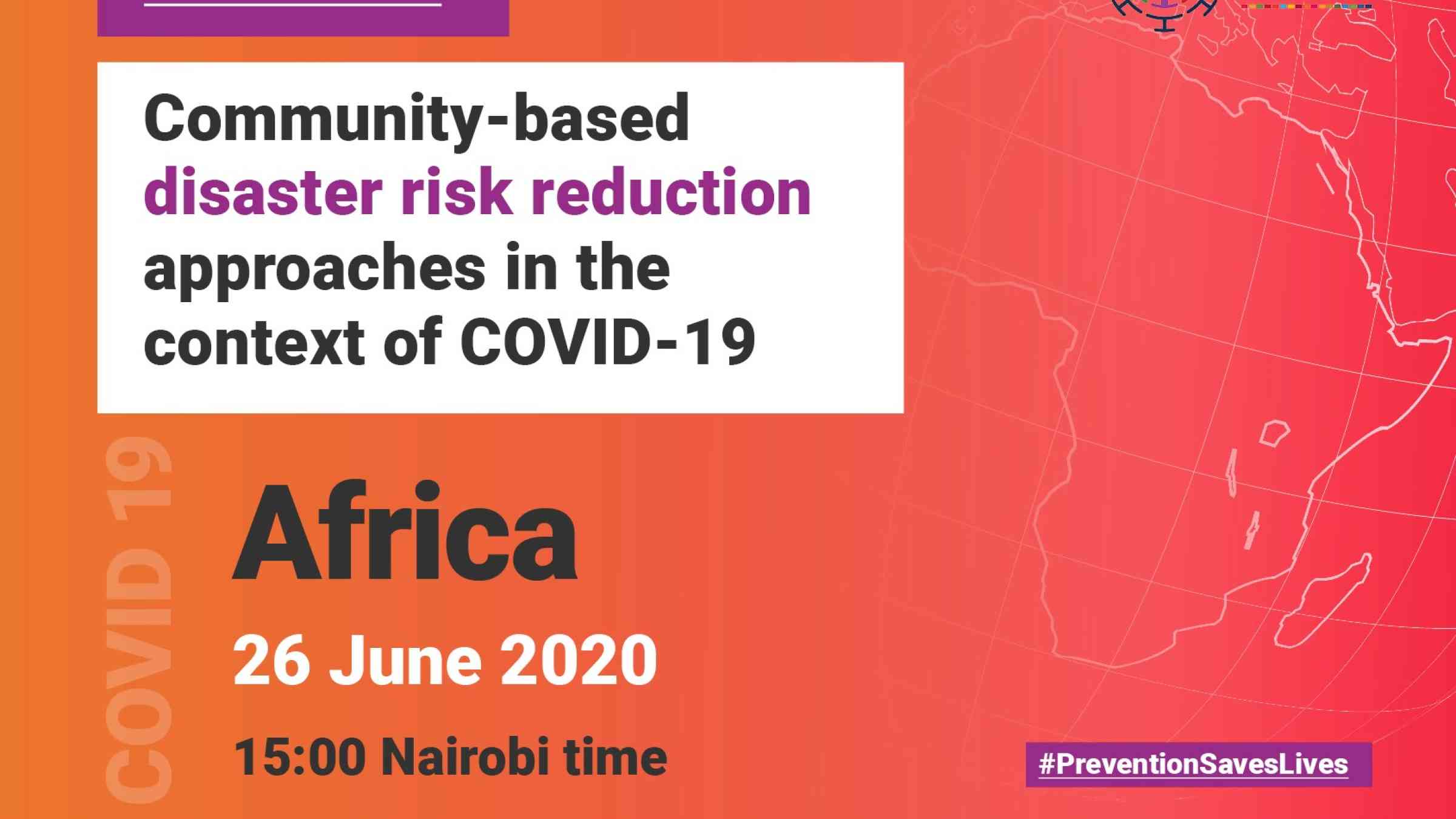Community-based disaster risk reduction approaches in the context of COVID-19 in Africa

Date: 26 June 2020
Time: 12:00 (GMT), 14:00 (CAT, SAST), 15:00 (EAT)
Language: English and French
Concept:
The COVID-19 pandemic is an unprecedented event in human history. It has challenged every nation, big and small, in a manner that has exposed countries’ lack of preparedness in light of pandemics. One of the key lessons emerging from this crisis is the need for a concerted effort by communities to take an all-of -the -society approach to strengthen coordination and delivery of measures to curb the crisis.
The scope of the Sendai Framework for Disaster Risk Reduction, adopted in 2015, was extended to include risks from small-scale and large-scale, frequent and infrequent, sudden and slow-onset disasters caused by natural and human-made hazards as well as related environmental, technological and biological hazards and risks. Evidence indicates that the exposure of persons and assets continues to increase faster than vulnerability is decreasing. This trend, coupled with the current inequalities[1], has seen the generation of new risks and a steady rise in disaster-related losses, with significant economic, social, health, cultural and environmental impact, especially at the local and community levels. With developing countries disproportionately affected, recurring small-scale disasters and slow-onset disasters mainly affect communities, households and small and medium-sized enterprises, which constitute a high percentage of all losses.
The Sendai Framework underlines the importance of putting in place resilient health systems and infrastructure, including for hospitals and other health facilities. The Sendai Framework, as a tool for building resilience of communities and countries, encourages DRR practitioners to localize their actions where disasters normally have the greatest impacts. It calls on governments and communities to strengthen the design and implementation of inclusive policies and social safety-net mechanisms that are integrated with livelihood enhancement programmes, including access to basic health-care services.
Civil Society Organizations (CSOs) have been instrumental in implementing the Sendai Framework at the local level through community-based disaster risk reduction and climate change adaptation programmes. They support local communities to strengthen their coping capacities against disaster impacts through practical and needs driven approaches.
GNDR and UNDRR have had a long-standing partnership, including in the context of the Africa Regional Platform on DRR (AfRP). In this regard, GNDR has been instrumental in mobilizing regional CSOs to hold consultations on gaps and challenges encountered when implementing the Sendai Framework at the local level. The consultations have led to a consensus joint voluntary commitment towards achieving the strategic objectives spelled out by the Africa Programme of Action for the implementation of Sendai Framework in Africa.
UNDRR works with GNDR to mobilize civil society organizations in Africa to ensure that they become active members of respective National DRR Platforms to advocate and support the development or updating of risk informed National and Local DRR Strategies including by promoting the inclusion of epidemics and pandemics such as COVID-19.
In this regard, the webinar will explore the measures, impacts and effectiveness of community preparedness and response to the current crisis of COVID-19 and how their work programmes have contributed to combating the pandemic.
Objective:
The webinar will examine coherence of community actions, policies and concerted and collaborative risk management practices that communities have put together to address the current crisis and what needs to be prioritized to support future challenges. It will also highlight how the local capacities for risk management and community resilience have played out during the COVID-19 crisis, including by illustrating Community-based disaster risk reduction practices and views from frontline communities. In addition, attention will be paid to strengthening understanding on how the Sendai Framework is being utilized as a community resilience tool to support these community practices at local level.
Expected Outcomes:
The webinar will seek to achieve the following outcomes:
- Shared experience of Community Based Disaster Risk Reduction approaches and their applicability during the COVID-19 crisis;
- Experience on the utility of existing locally led risk assessment methodologies for preparedness and response in extreme crises;
- Better understanding of the value of community-based DRR actions to build back better and continue reinforcing resilience in the COVID-19 context.
|
Agenda
|
|
|
10 minutes |
Welcome Remarks: Amjad Abbashar, Regional Director, UNDRR Regional Office for Africa Bijay Kumar, Executive Director, GNDR |
|
10 minutes |
Bijay Kumar, Executive Director of GNDR
Localization and community-based approach as key tools/processes to achieve sustainable development and resilience of communities most at-risk
|
|
10 minutes |
Buh Gaston, General Coordinator of Geotechnology, Environmental Assessment and Disaster Risk Reduction (GEADIRR).
The importance of locally led risk assessments to effectively address COVID-19 response and recovery and elements to include in the process
|
|
10 minutes |
Edna Kaptoyo, Partnerships and Policy, Pastoral Communities Empowerment Programme (PACEP), Tastagh Consortium
Best practice and opportunities for integration of CCA and DRR for community resilience |
|
10 minutes |
Emmanuel Seck, , Programme Coordinator. “Environnement-Développement- Action–Energie” (ENDA-Energie)
The value of community-based DRR actions to build back better and continue building resilience in the context of COVID-19
|
|
15 minutes |
Q @ A |
|
10 minutes |
Wrap-up and Way forward |
[1] Human Development Report 2019, UNDP